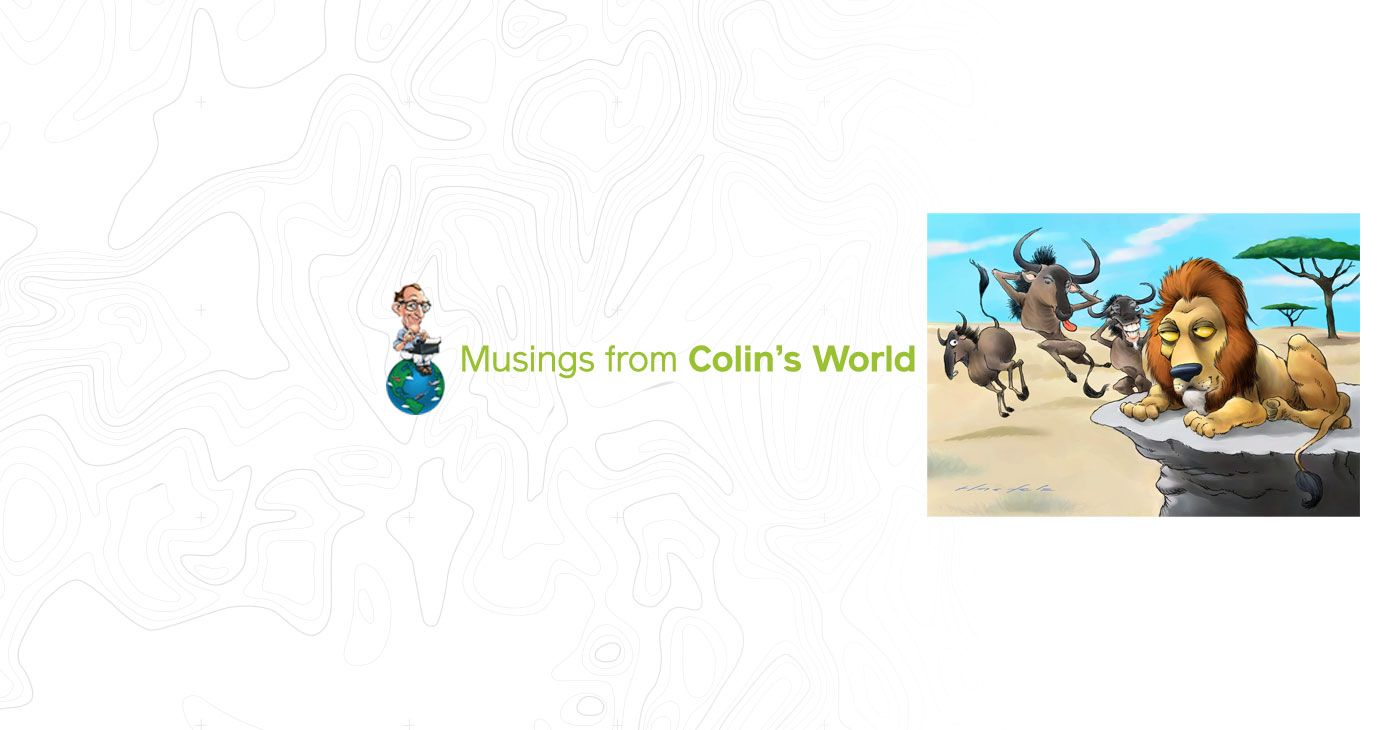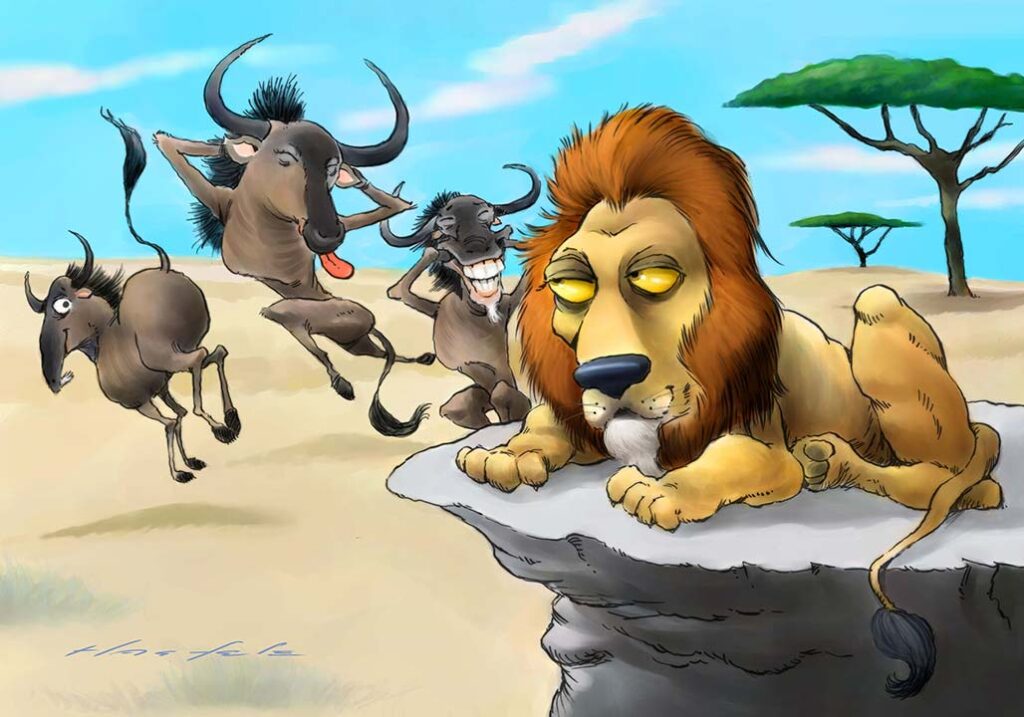
We gathered at the lodge in the dining area just before dawn to go out riding in the bush in an open Range Rover to look for animals. At that moment, at the trailing edge of night, we were hoping to see some of the nocturnal hunters before they disappeared for their daytime sleep. As we cut through the chilly morning air in the open vehicle, my fingers went numb from the cutting cold air. Luckily there were blankets in the Rover, and after the sun rose, it steadily warmed. Then I peeled off my layers, one by one, and it became very warm.
Though I’d previously been on safari in Kenya, it was my first safari in South Africa. It was very different terrain, much hillier, and it was a much different experience. We saw a great procession of animals, some of staggering beauty and presence. We saw giraffes, zebras, impala, wildebeests, rhinos, hippos, warthogs and lions. People always want to see the lions, the kings at the top of the food pyramid. They are regal and awe-inspiring. But the most dramatic encounter that day was with a young bull elephant.
While we were roving across the landscape, one of the women had spotted something moving and pointed it out to Ryan. He was our ranger guide, out in the bush every day and highly attuned to the environment. He can read where the wildlife have gone in clues such as a pile of dung, some footprints or broken branches on a bush. Like a wilderness Sherlock Holmes, he saw clues in all these things that were invisible to us.
Ryan looked to where the woman was pointing, stopped the Rover, and backed up to a place where we could see through the brush to an elephant that was busy ripping branches off a tree for lunch. Ryan drove the vehicle cautiously into the clearing where the elephant was maybe 50 feet away. “You always leave yourself an escape route,” he said. He turned off the engine and we settled back and watched the elephant.


This giant tearing branches off a tree delivered an overwhelming impression of massive power. It wasn’t pretty, by my customary aesthetics. Its skin was wrinkly, dusty and baggy, as if its pants didn’t fit. It had those peculiar flappy ears, pillar legs and the freakishly long snout with its bewilderingly precise dexterity.
Ryan pointed out that there was moisture on the inside of the elephant’s hind legs. That, he said, was an indication that the bull was “in musth,” an Afrikaaner/Dutch term meaning “intoxicated.” It was his mating season, when it is pumping a lot more testosterone through its veins than usual, and is a little agitated.
At first the elephant paid no mind to us as it yanked branches. Then for no reason that we could observe, it turned away from the tree and started lumbering in our general direction. All four of us guests in the Rover became tense. One of the women quietly suggested to Ryan that perhaps we should leave.
But Ryan remained cool and unmoved. He said that at that moment if we drove forward it would put us right in the elephant’s path, and that could annoy him. I was about to suggest sliding it into reverse and slipping out of there, but by then the elephant had crossed our path and was to our left, working over another tall bush about 20 feet away. It was facing the tree, but then it turned and started walking in our general direction, toward my side of the Rover – I could barely believe what was happening.
This beast was huge, of immense power. You could sense the force with which it pulled branches off trees and the rippling muscles under its loose skin. It was walking in our general direction. Ryan turned the key, cranked up the engine and we scooted out of there.
It had been a thrilling experience. It got the heart palpitating, pushed blood to the head, making the colors glow more brightly and the plants shimmer and vibrate. It was exhilarating and the buzz lasted into our sundowner, when we stopped for a drink out in the open.
Through it all, Ryan had remained confident and cool. He knows well what he is dealing with. If the elephant had intended to attack us, he said, it would have shaken its ears to warn us of its displeasure. Then before it actually attacked, it would have pulled its ears back flat against its head. And by that time, you’d better be gone. But it was not giving any of those signals. Someone asked if the elephant could have knocked over the Rover and Ryan laughed. The elephant could have effortlessly sent it flying. “I’ve seen them knock huge trees over,” he said.
The elephant was not in an attack mode, but it had been engaging us, Ryan said. What kept me from being afraid was that I was watching Ryan as much as I was watching the elephant. Seeing that he was showing total confidence, I knew we were safe. He would not have let us sit there if we had been in danger.
But it was an experience that has remained as a vivid memory to this day, though it was a long time ago. It was one of those experiences that changes you a little. Since then I’ve gone on a number of safaris and that has significantly changed the way I think and how I experience the world.
Seeing how the animals behave in the wild has greatly expanded my affinity with nature, and my understanding of myself as an animal in nature. I have learned to see through my own early social conditioning, when I was told about humans and animals as separate categories, implying that humans are not animals.
Even if I can’t totally shake my original conditioning, I know now that humans are of the genus primates, and the class of mammals. We are not separate. Wild dogs are pack animals. Lions live in prides. Humans live in families or tribes. We too are social animals and share a lot of the same behavior. When I watch animals that share so much with us, I learn about human beings.
I am always impressed with the way animals in those kinds of social groups work together with such graceful coordination. One of the rangers said to me, “The lions are great team hunters. The wild dogs are even better. But the best team hunters are the humans.” Human’s skills at social organization are the most complex and developed in the animal kingdom.
I was always deeply fascinated by the way that the lions, the most formidable of predators, are so tender and caring to each other during their leisure moments. Ferocious as they are during the hunt, they are feline, sensuous, and very demonstratively loving to their family members. Observing that was unexpected, and incredibly touching. They are predators, but they live a tough life.
I have learned through countless examples, that nature cannot be ultimately predicted, categorized or controlled. Nature has broken most of my preconceptions about it. Most everything I thought I knew has been disproven by real life.
Lions are at the top of the food chain, so surely they must strike fear and intimidation upon all who could become their prey. But it’s not the case in real life. I have seen buffaloes, who are often a meal for a pride of lions, chase and bully lions. I have seen a wildebeest run towards a lion, the king of beasts, and taunt it. Why? Nature always surprises.
My safari experiences are an essential part of who I am. In countless ways the safari experience has shaped my beliefs, the way I experience and try to understand the world. I am grateful for that every day of my life.
I always heartily recommend the safari experience. There is nothing like it, and in some ways it’s the peak experience available to a traveler in today’s world. It takes us back to our origins in the primeval forest.
Your humble reporter,
A. Colin Treadwell
Please visit:
Our Sponsor
